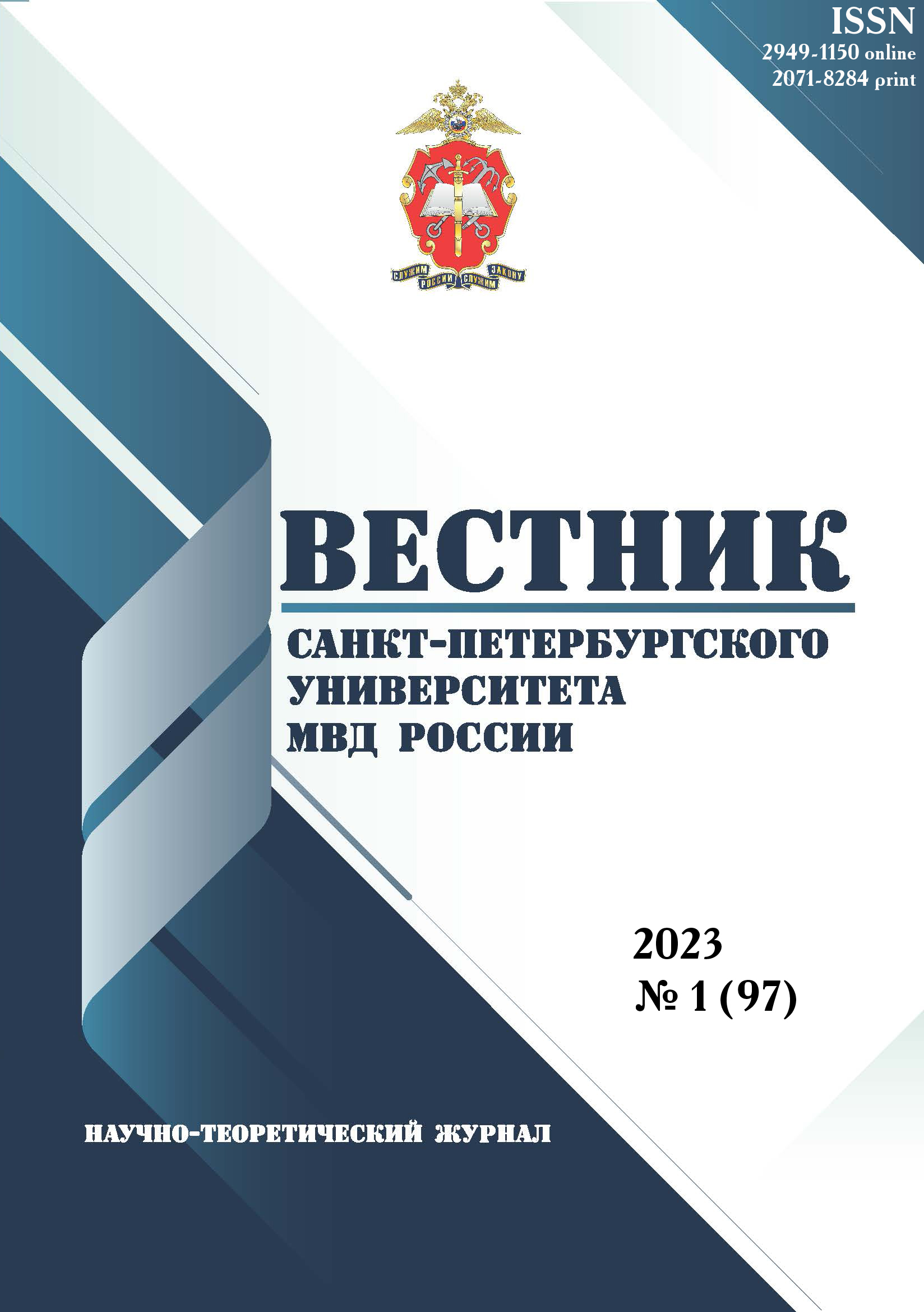UDC 159.9
Introduction. The research focuses on improving adaptation measures for offenders under probation. The relevance of the study is determined by the high rates of re-offending of supervised persons caused by the lack of a stable source of income, low level of education, absence of profession or necessary qualification, cessation (breakdown) of relationships, alcohol or drug addictions. The problem consists in the fact that individual preventive work with supervised persons needs to be improved and that there is a lack of a systemic understanding of how it should be organized. One of the stages of solving the problem is the examination of foreign experience of social adaptation of supervised persons and conceptualization of its theoretical foundations, definition of the subject area, characteristics and parameters. Research methods: theoretical methods of cognition: generalization, categorization and systematization of information on approaches, theories and concepts on the adaptation of administratively supervised persons. Results. The author reasons that foreign adaptation programs are based on sociological (structural functional and interactionist) theories and a group of socio-psychological ideas and concepts. Analysis of the programs also reveals the influence of national and cultural specificity on the organization of work with supervised persons. The main directions of adaptation are: (1) restoration of social functioning of this category of persons, carried out by means of legal, social and psychological support, (2) reintegration in the form of controlled involvement into the social relationships existed before the criminal punishment; (3) social and psychological adaptation aimed at countering criminalization, resocialization and rehabilitation. Conclusions. The value of social environment in social adaptation of supervised persons is identified. This environment can offer material and social resources that the subject lacks, be a source of expert information, education and psychological support. The author substantiates the need to verify the findings by further operationalizing the characteristics of the social environment in order to objectively assess its ability to implement the adaptation of persons subjected to administrative supervision.
administrative supervision, social adaptation of supervised persons, psychology of resisting recidivism, psychological factors of prevention, crime prevention
1. Avrutin R. Yu., Fomin A. A., Fomina T. F. O nekotoryh problemah provedeniya profilakticheskoy raboty uchastkovymi upolnomochennymi policii // Vestnik Kaliningradskogo filiala Sankt-Peterburgskogo universiteta MVD Rossii. - 2022. - № 3 (69). - S. 64-68.
2. Kaplunov A. I. O ponyatii administrativnogo prinuzhdeniya kak otraslevogo vida gosudarstvennogo prinuzhdeniya // Izvestiya vysshih uchebnyh zavedeniy. Pravovedenie. - 2004. - № 3 (254). - S. 118-126.
3. Holmanskiy V. I., Stul'nova T. V. Administrativno-pravovye aspekty ustanovleniya administrativnogo nadzora za licami, osvobozhdennymi iz mest lisheniya svobody // Nauchnyy portal MVD Rossii. - 2013. - № 4 (24). - S. 73-79.
4. Holmanskiy V. I. Chto meshaet vzaimodeystviyu policii i ugolovno-ispolnitel'nyh inspekciy v bor'be s rostom recidivnoy prestupnosti v obschestve? / V. I. Holmanskiy, T. V. Stul'nova // Yuridicheskaya nauka i praktika: istoriya i sovremennost' : sbornik materialov I Mezhdunarodnoy nauchno-prakticheskoy konferencii, Ryazan', 05 iyunya 2013 goda / Filial MIGUP v Ryazanskoy oblasti; Otvetstvennyy redaktor I. V. Pantyuhina. - Ryazan': Obschestvo s ogranichennoy otvetstvennost'yu «Izdatel'stvo «Koncepciya», 2013. - S. 243-250.
5. Allen D. F., D’Alessandro M. F., Bethell K. A resocialization intervention model in the prison - the family: people helping people project // Sociology International Journal. - 2017. - Vol. 1(4). - pp. 113-119. DOI:https://doi.org/10.15406/sij.2017.01.00019.
6. Esposito M. The Rehabilitation Role of Punishment in Prisons in Italy. Theoretical Development and Sociological Considerations // Sociology Mind. - Vol. 4. - 2014. - pp. 183-191. DOI:https://doi.org/10.4236/sm.2014.42018.
7. Faulkner D. The new shape of probation in England and Wales: Values and opportunities in a changing context // Probation Journal. - Vol. 55 (1). - 2008. - pp. 71-83. DOI:https://doi.org/10.1177/0264550507088684.
8. Folk J. B., Disabato D. J., Daylor J. M., Tangney J. P., Barboza S., Wilson J. S., Bonieskie L., & Holwager J. Effectiveness of a self-administered intervention for criminal thinking: Taking a chance on change // Psychological Services. - Vol. 13 (3). - 2016. - pp. 272-282. DOI: 10.1037/ ser0000079.
9. Friedrich W. What Makes People Reoffend? Predictors of Reconviction - A 2-year Longitudinal Study // Deviant Behavior. - July, 2022. - pp. 1-17. DOI:https://doi.org/10.1080/01639625.2022.2095238.
10. Gough D. & Coghlan M. Understanding Reoffending: Push factors and Preventative Responses. - University of Portsmouth, 2022. - 94 pp.
11. Liu L., Bachman R. Self-identity and persistent offending: aquantitative test of identity theory of desistance // Journal of Offender Rehabilitation. - Vol. 60 (5). - 2021. - pp. 341-357. DOI:https://doi.org/10.1080/10509674.2021.1931623.
12. MacKenzie C., Amirault J. From Incarceration to Reintegration: Using the Human Services Model to Manage Canadian Prisoner Mental Health // Journal Correction Health Care. - Vol. 27 (1). - 2021. - pp. 66-70. DOI:https://doi.org/10.1089/jchc.19.05.0046.
13. Martinez D. J. Role accumulation theory and prisoner reintegration: The pursuit of transformative social roles // Probation Journal. - Vol. 57 (2). - 2010. pp. 139-151. DOIhttps://doi.org/10.1177/0264550510362560.
14. Maruna S. Making good: How ex-convicts reform and rebuild their lives. Washington DC. - American Psychological Association Books. - 2001. - 211 p.
15. Maruna S. ‘Going Straight: Desistance from Crime and Self-Narratives of Reform’ // Narrative Study of Lives. - Vol. 5. - 1997. - pp. 59-93.
16. McGuire J. Integrating Findings from Research Reviews // Offender Rehabilitation and Treatment: Effective Programmes and Policies to Reduce Reoffending. - New York: J. Wiley, 2002. - 394 pp.
17. McNeill F. A desistance paradigm for offender management // Criminology and Criminal Justice. - Vol. 6(1). - 2006. - pp. 39-62.
18. Paternoster R. & Bushway S. Desistance and the “feared self ”: Toward an identitytheory of criminal desistance // Journal of Criminal Law and Criminology. - Vol. 99. - 2009. - pp. 1103-1156.
19. Tang S. Effective Rehabilitation and Reintegration of Offenders. Resource Material Series. - Vol. 82. - Tokyo, Japan: UNAFEI, December, 2010. - pp. 41-51.
















